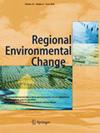德国慕尼黑日托中心与气候变化有关的健康危害:风险认识和适应措施
IF 3.4
2区 环境科学与生态学
Q2 ENVIRONMENTAL SCIENCES
引用次数: 0
摘要
由于儿童的脆弱性,他们需要特别保护,免受气候变化对健康的影响,这在今天已经很明显了。由于德国很大一部分儿童白天由非父母照料,日托中心的教学人员在保护儿童健康方面发挥着至关重要的作用。出于这个原因,在慕尼黑一家托儿所的教学人员(n = 181)中进行了一项定量在线调查,这些托儿所的儿童年龄在9周到10岁之间。研究了教学人员如何评估与气候变化有关的健康危害在今天和今后10年的工作中对儿童健康和自身健康的风险。此外,还调查了日托中心是否实施了(与健康有关的)适应气候变化和以可持续发展教育(ESD)形式长期缓解气候变化的措施。对结果进行描述性统计分析和多元线性回归分析,以检验假设的关联。结果表明,尽管对气候变化相关的健康风险有较强的认知,但大多数日托中心在相应的保护和适应措施方面实施不足。教学人员的知情程度证明是执行各项措施的决定性影响因素。因此,除了在日托中心加强实施结构适应措施外,还应在教学人员的培训课程和继续教育中越来越多地传达针对目标群体的知识和行动指导。本文章由计算机程序翻译,如有差异,请以英文原文为准。
Climate change-related health hazards in daycare centers in Munich, Germany: risk perception and adaptation measures
Abstract Due to their vulnerability, children need special protection from health effects of climate change, which are already noticeable today. Since a large proportion of children in Germany are in non-parental care during the day, the pedagogical staff in daycare centers play a crucial role in protecting children’s health. For this reason, a quantitative online survey was conducted among pedagogical staff ( n = 181) in daycare centers of one provider in Munich, where children aged nine weeks to 10 years are cared for. It was examined how the pedagogical staff assesses the risk of climate change-related health hazards on children’s health and on its own health at work today and in the next 10 years. Additionally, it was surveyed whether or which measures for (health-related) adaptation to climate change and long-term climate change mitigation in the form of education for sustainable development (ESD) are implemented in the daycare centers. The results were statistically analyzed both descriptively and with multiple linear regression analyses to test the assumed associations. The results show that despite the strong perception of climate change-related health risks, their implementation in corresponding protection and adaptation measures is insufficient in most of the daycare centers surveyed. The informedness of the pedagogical staff proved to be a decisive influencing factor in the implementation of measures. Therefore, in addition to stronger implementation of structural adaptation measures in daycare centers, target group-specific knowledge and instructions for action should also be increasingly conveyed in the training curricula and further education of pedagogical staff.
求助全文
通过发布文献求助,成功后即可免费获取论文全文。
去求助
来源期刊

Regional Environmental Change
环境科学-环境科学
CiteScore
6.80
自引率
2.40%
发文量
125
审稿时长
4.5 months
期刊介绍:
Environmental changes of many kinds are accelerating worldwide, posing significant challenges for humanity. Solutions are needed at the regional level, where physical features of the landscape, biological systems, and human institutions interact.
The goal of Regional Environmental Change is to publish scientific research and opinion papers that improve our understanding of the extent of these changes, their causes, their impacts on people, and the options for society to respond. "Regional" refers to the full range of scales between local and global, including regions defined by natural criteria, such as watersheds and ecosystems, and those defined by human activities, such as urban areas and their hinterlands.
We encourage submissions on interdisciplinary research across the natural sciences, social sciences and humanities, and on more focused studies that contribute towards the solutions to complex environmental problems. Topics addressed include (i) the regional manifestations of global change, especially the vulnerability of regions and sectors; (ii) the adaptation of social-ecological systems to environmental change in the context of sustainable development; and (iii) trans-boundary and cross-jurisdictional issues, legislative and governance frameworks, and the broad range of policy and management issues associated with building, maintaining and restoring robust social-ecological systems at regional scales.
The primary format of contributions are research articles, presenting new evidence from analyses of empirical data or else more theoretical investigations of regional environmental change. In addition to research articles, we also publish editorials, short communications, invited mini-reviews on topics of strong current interest, as well as special features that provide multifaceted discussion of complex topics or particular regions
 求助内容:
求助内容: 应助结果提醒方式:
应助结果提醒方式:


